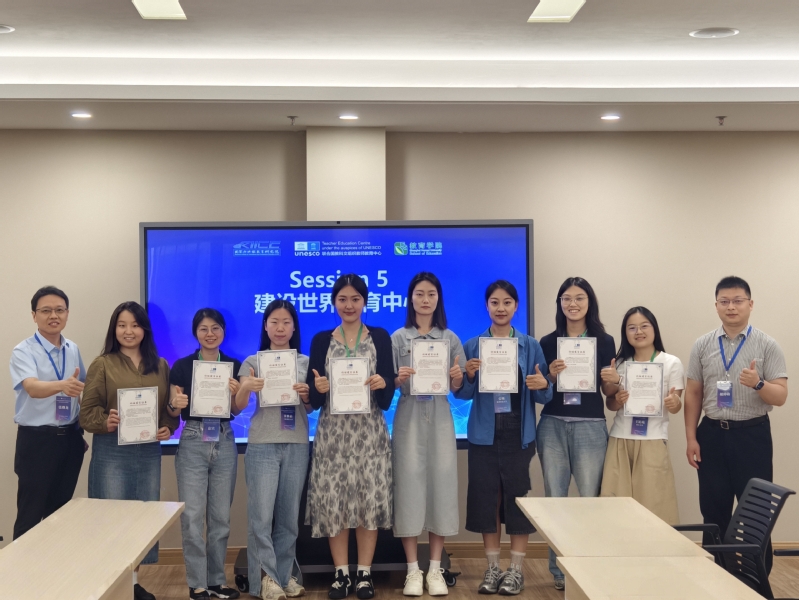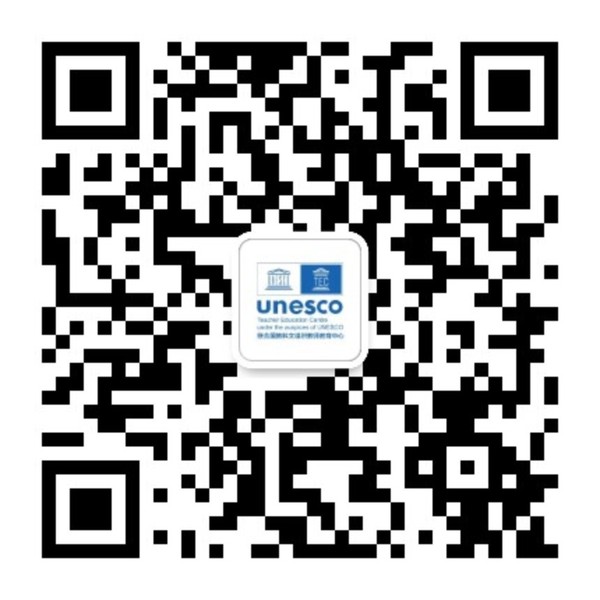Parallel Session 1: Global Talent Cultivation and Agglomeration
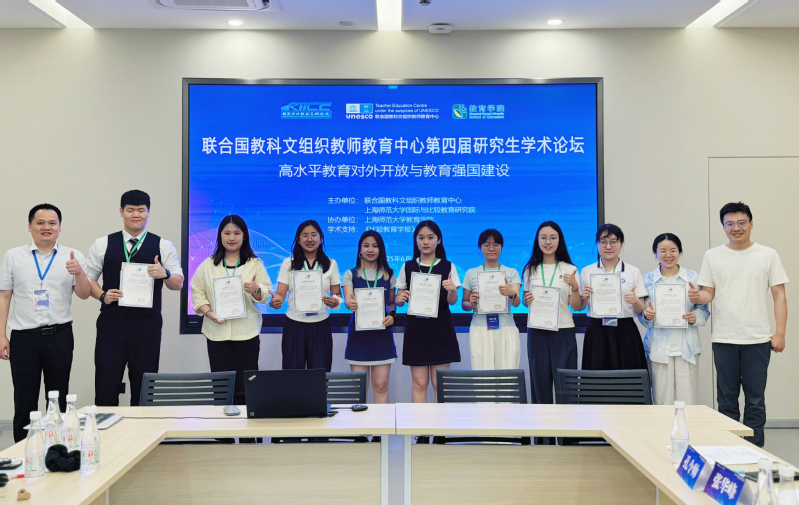
With the theme Global Talent Cultivation and Agglomeration, Parallel Session 1 was chaired by Ms. Shen Qiuyu from Shanghai Normal University (SHNU). Professor Kong Lingshuai and Associate Professor Zhang Huafeng from the Institute of International and Comparative Education at SHNU served as review experts.
Ms. Hu Yizhuo from Zhejiang University introduced the main types and strategic shift trends of international talent cultivation models in research universities of China, the United States, and Singapore. Ms. Yang Yaxin from SHNU deconstructed the policy framework of Denmark’s industrial doctoral programs and analyzed the collaborative cultivation mechanism of these programs based on the Triple Helix Theory. Ms. Zhao Jinyi from Xiamen University explored, from four dimensions (chronosystem, mesosystem, exosystem, and macrosystem), how the U.S. Advanced Technological Education Program uses community colleges as the core carrier to build a high-skilled talent cultivation ecosystem connecting technical education and higher engineering education. Ms. Shen Qiuyu from SHNU presented the U.S. model of cultivating international organization talents through the university-enterprise-government internal circulation mechanism, focusing on three aspects: resource internal circulation, capability internal circulation, and identity internal circulation. Ms. Yao Honglin from Chongqing Normal University proposed strategies for promoting the cultivation of top innovative talents through scholarship of teaching, covering four areas: cultivation objectives, curriculum systems, teaching methods, and research training. Mr. Jiang Donggui from Harbin Normal University conducted a multi-dimensional analysis of factors influencing online learning among South Korean university students. Ms. Zhang Yinxiu from SHNU attempted to explore the issue of academic autonomy after the Trump administration’s lawsuit against Harvard University from the perspective of higher education discipline. Ms. Lu Huixin from Hainan Normal University reported on the practical paths for pre-service student teachers in Southeast Asia to participate in the Southeast Asian Teacher Education Community through exchange programs. Ms. Wu Minyu from South China Normal University systematically introduced the experiences and enlightenment of teacher ethics construction in Belgium in terms of legalization and training systems from the perspective of educational opening-up.
Professor Kong Lingshuai and Associate Professor Zhang Huafeng affirmed the research of the students in Parallel Session 1, particularly highlighting the theoretical awareness demonstrated by the new generation of postgraduates. They put forward valuable suggestions, such as research scope should be focused, avoiding superficial discussions across multiple countries and cases; instead, in-depth research on a single country is recommended and combining practical backgrounds and local practices to enhance the relevance and application value of research.
Parallel Session 2: Global Education Development and Governance
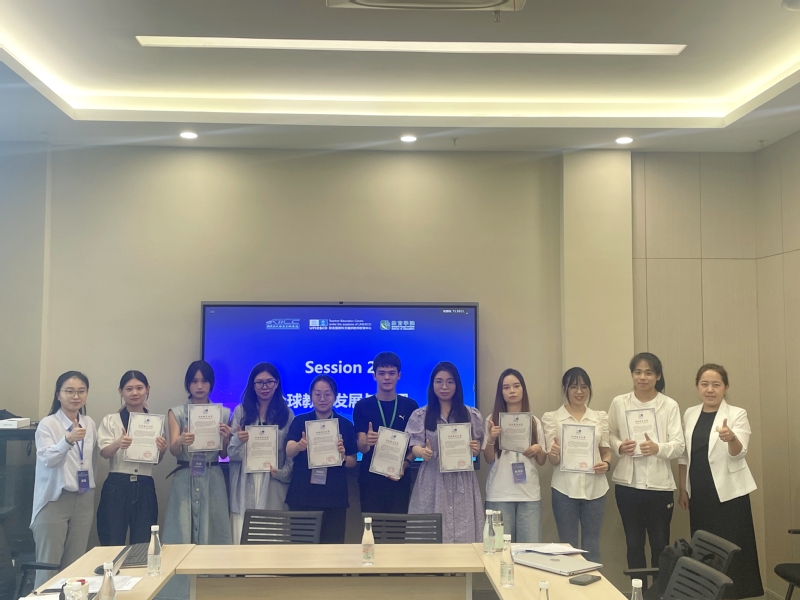
Centered on Global Education Development and Governance, Parallel Session 2 was chaired by Ms. Xu Miao from SHNU. Associate Professor Song Jia from the Institute of International and Comparative Education at SHNU and Dr. Tao Yuan from the College of Education at SHNU acted as review experts.
Mr. Wang Shuaijie from East China Normal University (ECNU) conducted a comparative analysis of the logic of OECD and UNESCO in participating in global sustainable development education governance based on Foucault’s biopolitics theory, revealing the two organizations’ different orientations (human capital vs. population biopolitics governance) in sustainable development education. Ms. Chen Xiang from Fudan University introduced UNESCO’s path of building peace through education from three aspects: cognitive reconstruction, norm advocacy, and talent empowerment. Ms. Chen Cuiping from Xiamen University presented the operation status of China’s overseas branch campuses, analyzed the practical dilemmas in their operation, and proposed optimization paths. Ms. Zhang Pu from Beijing Foreign Studies University analyzed the implementation background, operation mechanism, content design, and implementation characteristics of Australia’s Resilience, Rights and Respectful Relationships program, providing a new perspective for promoting the systematic and localized development of social-emotional learning in primary and secondary schools. Mr. Wu Yundong from Dongshin University (South Korea) introduced how OECD exerts a key influence on South Korea’s education policies under the global governance framework through policy recommendations, data collection, and ranking systems. Ms. Liu Yujiao from KU Leuven (Flemish Region, Belgium) explored the impact of language teachers’ participation in international exchanges on their professional competence and sense of professional meaning from three dimensions: international cooperation models, regional differences, and teachers’ professional development. Ms. Liu Runxin from SHNU analyzed the historical context and institutional logic of Singapore’s school child protection system from the perspective of historical institutionalism. Ms. Xu Miao from SHNU took the educational dilemmas and psychological challenges of Ukrainian adolescents in the context of war as the starting point, discussing the construction process of their psychological resilience system and the role of multi-agent collaboration mechanisms in adolescent psychological intervention.
Associate Professor Song Jia and Dr. Tao Yuan highly affirmed the cutting-edge nature of the students’ research topics and their efforts in theoretical application, offering full encouragement. From the perspective of comparative education, Associate Professor Song Jia emphasized that research should go beyond simple descriptions of national experiences, instead deeply explaining the causes of cultural differences and focusing on local learning for Chinese issues. Dr. Tao Yuan, targeting specific cases, pointed out that it is necessary to enhance the rigor of theoretical frameworks, the diversity of research methods, and the clarity of problem awareness to improve the logicality and academic depth of the papers.
Parallel Session 3: Global Perspectives on Teacher Development
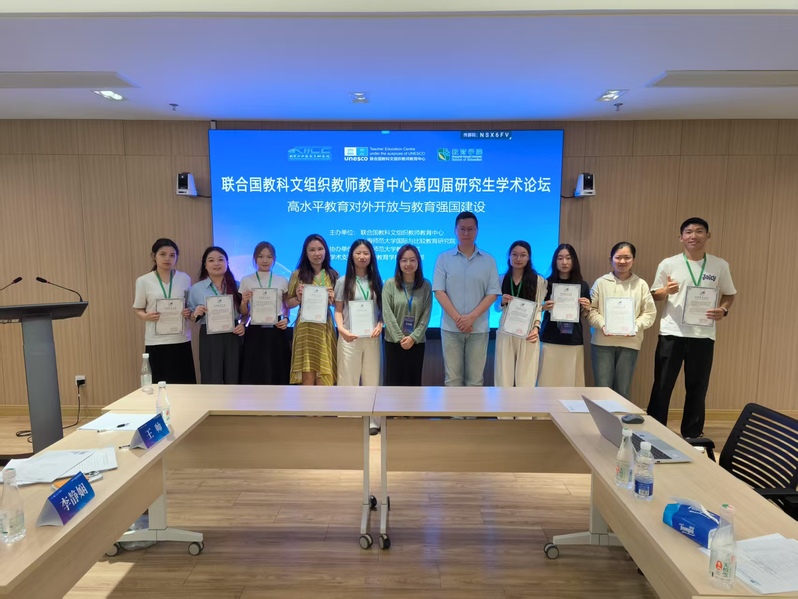
With the theme Global Perspectives on Teacher Development, Parallel Session 3 was chaired by Mr. Shen Huayu from SHNU. Associate Professor Wang Shuai from the College of Education at Shanghai Jiao Tong University and Dr. Li Jingxian from the College of Education at SHNU served as review experts.
Ms. Teng Xinyi from the University of Toronto revealed the complex situation in the implementation of China’s Double Reduction policy through in-depth interviews with primary school teachers in Shanghai. Ms. He Xiaojie from Zhejiang University identified three practical models of teacher collaboration in Finland: peer group mentoring for new teachers, interdisciplinary collaborative teaching, and national teacher collaboration networks. Ms. Liu Xiaoyu from SHNU sorted out the complete cultivation chain of U.S. educational drama teachers, covering university program setup, practical teaching, and certification systems. Ms. Zhang Shiya from Capital Normal University compared teacher workload reduction measures in the UK, Japan, and New Zealand, exploring methods for targeted workload reduction for teachers. Ms. Chen Xiaorui from Hunan University selected six types of countries (including the U.S., Australia, and Japan) to analyze the common characteristics of rural teacher retention policies against the background of declining birthrates. Mr. Jin Yufei from SHNU proposed that teacher occupational safety should shift from static protection to a dual-track system of bottom-line constraints + flexible exit. Ms. Tang Jiayu from South China Normal University, taking Ontario (Canada) as an example, pointed out that Canada has established a primary and secondary school teacher admission system featuring industry qualifications + ethical screening. Ms. Zheng Rouyu from SHNU discussed the experiences and lessons of South Korea’s basic education in responding to population changes over 50 years. Mr. Shen Huayu from SHNU, based on interviews with 26 Indonesian principals from 16 provinces, revealed the opportunities and challenges of cross-border cooperation in teacher education between China and Indonesia under the Belt and Road Initiative.
Associate Professor Wang Shuai and Dr. Li Jingxian fully affirmed the cutting-edge nature of the students’ topics and their efforts in paper writing, while pointing out that some studies need to further clarify core contradictions in phenomenon description—for example, deepening the analysis of trade-off mechanisms in Double Reduction policy research to avoid overgeneralization of topics, and ensuring the representativeness of sample selection in cross-country comparative studies.
Parallel Session 4: International Cooperation in Teacher Education
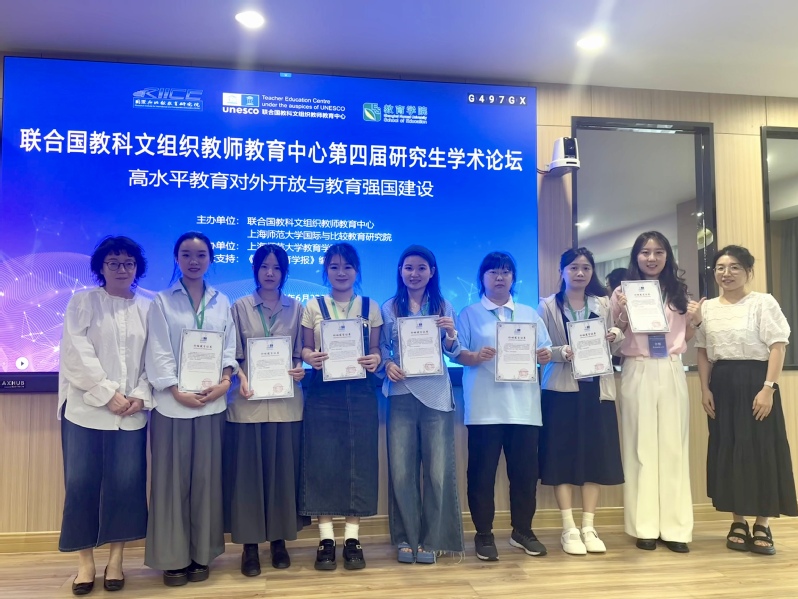
Focused on International Cooperation in Teacher Education, Parallel Session 4 was chaired by Ms. Zhang Nian from SHNU. Research Fellow Chen Licui from Zhejiang University, Professor Wang Jie, and Dr. Sun Yang from the Institute of International and Comparative Education at SHNU acted as review experts.
Mr. Huang Haoyan from the University of Helsinki comprehensively explored the role of different school psychological needs support methods in promoting pre-service teachers’ cognitive curiosity, using a combination of traditional tracking and experience sampling methods based on Self-Determination Theory. Ms. Tang Xiaoxia from Jiangsu University systematically revealed the formation mechanism of non-teaching burdens on young teachers and proposed sustainable mitigation paths through qualitative analysis of in-depth interviews with 24 young teachers and 150 social media posts. Ms. Cui Zichen from SHNU pointed out that Finland cultivates research-oriented teachers through an integrated pre-service induction-in-service model, providing enlightenment for the development of China’s teacher education system. Ms. Zhang Nian from SHNU focused on the construction of a teacher education system with Chinese characteristics, expounding on its development process, achievements, and challenges. Ms. Xin Tong from South China Normal University discussed the core structure and operational logic of South Korea’s teacher ethics system from three levels: institutional norms, operational mechanisms, and support guarantees, and put forward relevant enlightenment for China. Ms. Zhu Chunting from South China Normal University focused on the qualification certification system for basic education teachers in the Guangdong-Hong Kong-Macao Greater Bay Area, analyzing it from three aspects: practical investigation, institutional reflection, and optimization paths. Ms. Chang Meihui from Xinyang Normal University pointed out the advantages of the U.S. non-university-based teacher education model in alleviating teacher shortages and the resulting crises and controversies, suggesting transcending either-or thinking to build a teacher education ecosystem in line with China’s national conditions. Ms. Jiang Qiuhong from South China Normal University, based on the teacher development community theory, systematically sorted out and in-depth analyzed the collaborative teacher development practices in the Guangdong-Hong Kong-Macao Greater Bay Area over 20 years (2004-2024) to explore future directions.
After the presentations, Research Fellow Chen Licui commented on the students’ papers by categorizing them into empirical research, historical research, and comparative research, putting forward targeted suggestions. Professor Wang Jie provided guidance from aspects such as clarity of research questions, quality of literature review, structural clarity, rigor of argumentation, and the implication section. Dr. Sun Yang commented on each student’s research one by one and proposed specific improvement suggestions.
Parallel Session 5: Building a World Education Hub
|
With the theme Building a World Education Hub, Parallel Session 5 was chaired by Ms. Sun Yuchen from SHNU. Associate Professor Zhang Jilong and Dr. Hu Zhongxun from the College of Education at SHNU served as review experts.
Ms. Zhang Yaru from SHNU reported on the adjustment trends, influencing factors, and optimization paths of higher education discipline structures in major developed countries and China. Ms. Dong Haixia from Shaanxi Normal University explored the characteristic paths and common strategic choices formed in the long-term historical development of educational opening-up in the UK, France, Germany, and the U.S., starting from the origin of world education hubs, and finally proposed possible future development strategies combined with China’s practical national conditions. Ms. Wang Qinyuan from Zhejiang University introduced the motivations, governance models, practical challenges, and future development directions of European University Alliances. Mr. Geng Hongwei from Tongji University conducted an explanatory multi-case study on the discipline and program adjustments of four Japanese universities from 2015 to 2024 from the perspective of structural functionalism. Ms. Zhao Yaqi from China University of Geosciences summarized general experiences and enlightenment from the state, university, society, and academic association levels by analyzing the basic concepts and measures of the international community in supporting female researchers. Ms. Sun Yuchen from SHNU introduced the global education governance path of the 7th Erasmus+ Programme, revealing the subjects, mechanisms, and purposes of its education governance, and analyzing its implementation effects and challenges from different dimensions. Ms. Zhang Shan from Shaanxi Normal University explored the form of the EU higher education space under the background of digital transformation from a spatial dimension, how digital technology reshapes higher education practices, and finally proposed its practical characteristics. Ms. Li Zhongyu from Southwest University explored the coupling path of international aid and knowledge dissemination from the perspective of international relations to create a favorable international public opinion environment.
Associate Professor Zhang Jilong and Dr. Hu Zhongxun affirmed the research of the eight students, believing that their topics are innovative and of contemporary significance, with strengths including high theoretical literacy, detailed research data collation, and in-depth case analysis. The two teachers also put forward follow-up suggestions, such as appropriate application of research theories, enhancement of practical relevance, and dynamic in-depth analysis of research objects.
Parallel Session 6: Educational Transformation in the Digital Age
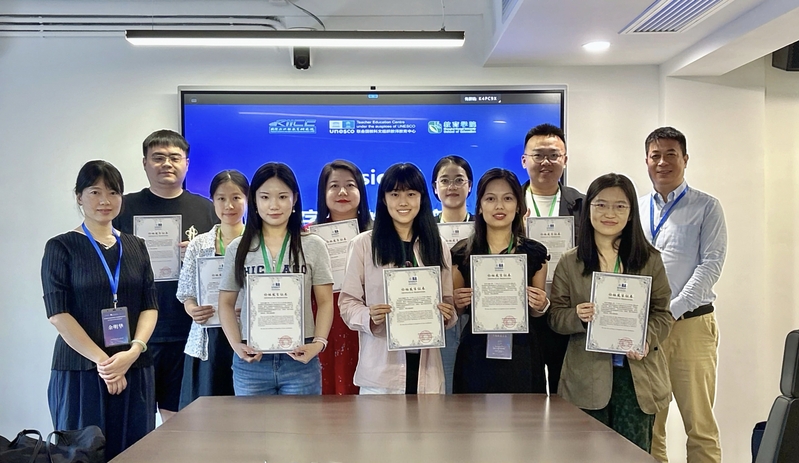
Centered on Educational Transformation in the Digital Age, Parallel Session 6 was chaired by Ms. Shi Chengying from SHNU. Associate Professor Zhu Xiaohu from the Institute of International and Comparative Education at SHNU and Dr. Yu Minghua from the College of Education at SHNU acted as review experts.
Ms. Zheng Yu from Sookmyung Women’s University (South Korea) explored the impact of ICT on students’ reading literacy based on PISA 2022 data. Mr. Wei Zhipeng from South China Normal University analyzed the development path of Singapore’s lifelong learning public services from the perspective of digital governance theory. Ms. Qin Yuzhen from ECNU analyzed the paths and values of AI-empowered interdisciplinary teaching based on 27 empirical research papers. Ms. Shi Chengying from SHNU explored the global university AI talent cultivation models from the perspective of innovation ecosystem theory. Ms. Hou Jia from SHNU, taking Vietnamese higher education as an example, discussed the dilemmas of Global South countries in higher education digital transformation and reflected on China’s role in South-South cooperation. Ms. Lai Minmin from Fuyang Normal University explored the construction of a digital education resource sharing mechanism under the Belt and Road Initiative from two perspectives: practical progress and key obstacles. Mr. Li Qinghao from ECNU explored the cultivation paths of pre-service teachers’ digital literacy and their differential impacts from the perspective of normal education resource supply. Ms. Chen Zhaoru from SHNU analyzed the maternal role practice of Chinese rural mothers in sharing children’s lives on social networks and the process of media re-domestication from the perspective of domestication theory. Mr. Zhao Yi from Zhejiang University conducted an in-depth analysis of the complex nature of teaching and its future goals based on the OECD report Unlocking High-Quality Teaching.
Associate Professor Zhu Xiaohu and Dr. Yu Minghua affirmed the research achievements of the nine students and put forward valuable suggestions respectively. Associate Professor Zhu Xiaohu pointed out that the coverage of data samples and statistical analysis methods in the quantitative research design of some topics could be further optimized to enhance the generalizability of research conclusions. From the perspective of educational technology, Dr. Yu Minghua suggested that students integrate more discussions on the application scenarios of intelligent educational tools into their analytical perspectives, emphasize that research significance should be closely linked to the actual needs of current educational digital transformation, and remind them to pay attention to the accuracy of literature citations and the visualization of chart data in academic standardization.
Parallel Session 7: International Trends in Mathematics Education
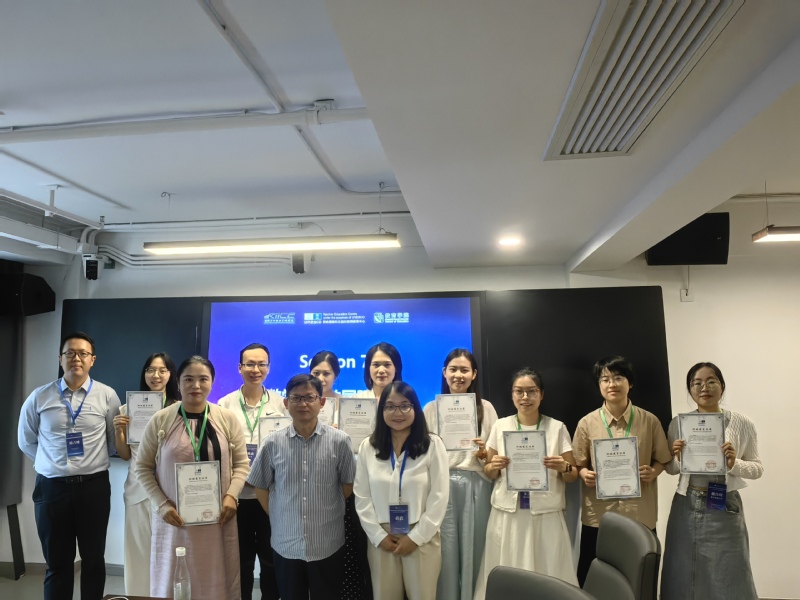
With the theme International Trends in Mathematics Education, Parallel Session 7 was chaired by Mr. Sun Zhihua from SHNU. Professor Huang Xingfeng from the Institute of International and Comparative Education at SHNU and Associate Professor Jiang Zheng from the School of Mathematics and Science at SHNU served as review experts.
Ms. Zhang Runyu from ECNU conducted a probability teaching research based on Scratch, confirming that this teaching model can improve junior high school students’ computational thinking and probability knowledge, providing a practical example for the integration of information technology and mathematics curriculum. Ms. Xu Wenyu from the University of Tsukuba (Japan) focused on set-based integration and consistency of numbers and operations, comparing the content of number and calculation teaching in primary school mathematics between China and Japan, and revealing the differences and enlightenment in teaching concepts and content integration between the two countries. Ms. Chen Binying from Hangzhou Normal University conducted quantitative statistics and qualitative analysis on the interdisciplinary content of mathematics textbooks in China, South Africa, Ethiopia, and Kenya, providing references for China’s STEM assistance to Africa and mathematics interdisciplinary education. Ms. Lou Jiayu from Zhejiang Normal University analyzed the compilation characteristics (such as knowledge structure and compilation format) of the New Smart primary school mathematics textbook in Nigeria, providing enlightenment for mathematics textbook compilation and teaching practice. Ms. Meng Jing from Tianjin Normal University constructed a four-dimensional and twelve-type analytical framework to compare the presentation of creative thinking in primary school mathematics textbooks of China, the UK, Singapore, and the U.S., revealing the commonalities and differences in cultivation models among various countries. Mr. Jian Huansen from the University of Macau compared the junior high school mathematics curriculum standards of the Chinese mainland and Macau using the strategy-constraint-process analytical framework, pointing out that the curriculum standard reform in the Chinese mainland takes promoting strengths and avoiding weaknesses as the core strategy, aiming to enhance the international competitiveness of mathematics education. Ms. Zhu Huiling from Zhejiang Normal University took the 2021 edition of Star primary school mathematics textbook in Singapore as the research object, analyzed the task design of creativity factors in it, and examined its presentation characteristics in dimensions such as divergent thinking and convergent thinking. Ms. Chen Yongbing from Fujian Normal University explained the connotation of primary school mathematics model awareness, constructed a three-dimensional behavioral performance framework of perception-application-construction, and verified the practical guiding value of this framework for unit learning objective design through teaching cases. Ms. Mao Yiting from SHNU studied the impact of mind mapping on seventh-grade students’ collaborative solution of mathematics problems through experimental research, finding that it can promote positive performance in cognitive activities, interactive communication, and emotional experience.
Professor Huang Xingfeng and Associate Professor Jiang Zheng fully affirmed the efforts made by the nine students in their research, highly praised the research literacy of the new generation of master’s students, and commented on each student’s work one by one. They put forward constructive suggestions regarding topic positioning, theoretical frameworks, research methods, research significance, and language expression.
Parallel Session 8: STEM Education and Innovative Talent Cultivation
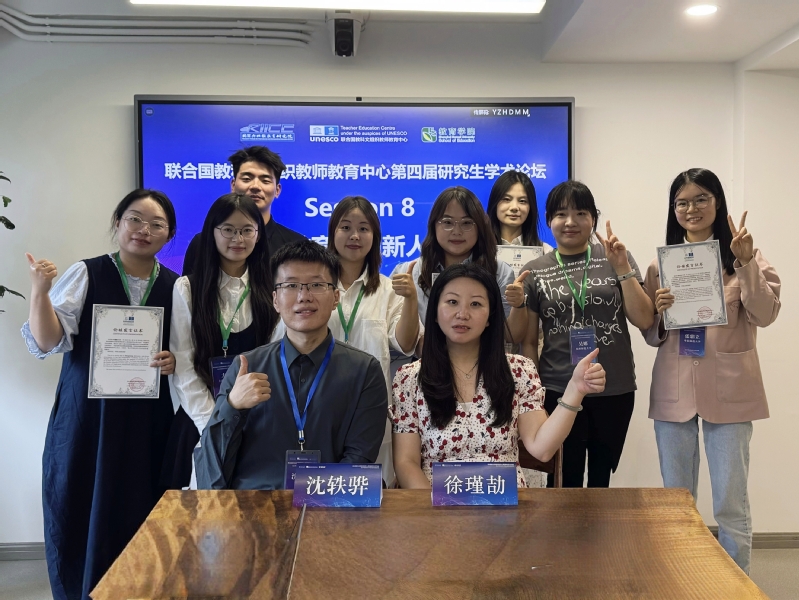
Focused on STEM Education and Innovative Talent Cultivation, Parallel Session 8 was chaired by Ms. Fang Fan from SHNU. Professor Xu Jinjie and Dr. Shen Yihua from the Institute of International and Comparative Education at SHNU acted as review experts.
Ms. Tang Rong from SHNU introduced and analyzed the interdisciplinary collaboration-based learning engineer cultivation system from three parts: research background, analysis of the Metals program, and enlightenment and summary. Mr. Zhou Yongchen from Chongqing Normal University analyzed the cultivation framework of U.S. science and technology high schools from aspects such as admission mechanisms and curriculum settings, combining domestic and international backgrounds. Ms. Cheng Yiling from Beijing Foreign Studies University constructed a four-dimensional analytical framework for the demand adaptability of U.S. informal STEM education from the perspective of educational equity, exploring how it responds to the diverse needs of students from different backgrounds in basic education. Mr. Zhang Dingli from ECNU introduced and analyzed the conceptual propositions, effects, and practical paths of localized socio-scientific issue teaching in the U.S., pointing out its important significance for promoting environmental sustainable development education. Ms. Wu Na from Hangzhou Normal University discussed the K-12 environmental and sustainable development education model in the U.S. state of Washington in response to the current sustainable development crisis, summarized its educational goal orientation, practical paths, and main characteristics, and put forward enlightenment views on sustainable development education in China’s basic education. Ms. Li Mengmeng from ECNU analyzed the mechanism and effect of Germany’s female STEM policies based on a three-dimensional policy analysis framework and combined with the UNESCO gender equality framework, and discussed how to promote the development of female scientific and technological talents in China. Ms. Fang Fan from SHNU analyzed the multi-agent collaboration process of U.S. international talent cultivation from the perspective of Actor-Network Theory, pointed out the existing problems in current U.S. international talent cultivation, and introduced the enlightenment of U.S. international talent cultivation for China.
Professor Xu Jinjie and Dr. Shen Yihua affirmed the research achievements of the eight students, believing that these topics focus on different educational phenomena and adopt perspectives from different countries. At the same time, the two teachers put forward valuable suggestions for each student’s presentation: first, clearly define concepts to ensure clarity; second, enhance critical thinking to focus on research depth; third, pay attention to the innovation and appropriateness of research methods and theories.



